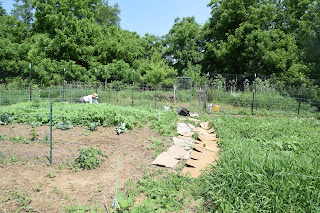So many living things make up our environment. Looking out my window here on our family farm, there is green everywhere. From the upstairs windows, waving leaves fill the scene with vitality and color. On the ground, grasses and other herbaceous friends cover the earth. And below that, there are billions of friendly soil microbes, earthworms, and all manner of unseen residents. Birds sing from their perches in the trees. A gentle breeze carries insects through the air. For an entire square mile this morning, here on the farm, I am the only human being. But my living community will change very soon. I'll be moving to Prairie Hill.

Out here in the country, it is easier to see the inter-relationships between all living and non-living aspects of the world. Everywhere there is diversity, every plant with its own niche, its own purpose. All living beings find ways to live together, even benefit from each other. There are vast webs of communication invisible to us. In contrast, people predominate in the city. And yet at Prairie Hill we want to live in a peaceful and respectful relationship with the natural world, the non-human world. Fortunately, we have many guides in this. Much has been discovered about ecological relationships. Intent and awareness can help to inform how we relate to the wider non-human world around us. At least in some circles, this kind of wide thinking is in vogue and we will feel supported and encouraged to live sustainably.

However, the most challenging aspect of community may turn out to be the relationships between the people living together, learning how to put our personal preferences aside sometimes in favor of the health of the whole. Our culture does not encourage us to think this way. In fact, we are a country of fierce individualists. We treasure our freedom. And our capitalistic economy emphasizes competing against each other for financial gain instead of cooperating. We're immersed in this worldview from the time we're born, if we live in the United States: individualism and competition. I know this has been true for me, even though my Quaker upbringing gave me views into other ways of seeing the world. I love my independence here on the farm. And I breathed in competition in school, in sports and in the family system from an early age. So here I am, preparing to live in a community in which cooperation is the accepted mode of relating.

I know cooperation is the right direction to be heading. Look where competition and individualism have gotten us! We badly need to find different ways of living. Surely if we can send people to the moon, can communicate instantaneously across the planet, we can find ways of living peacefully together. It has been done before, thousands, millions of times. We can get back to a healthier way of living. And so at Prairie Hill we are engaged in the process of finding structures that help us to think holistically. When an issue comes up for decision-making, not only do we think about our own personal preference, but also try to think about how this decision will affect everyone---other members, plants, animals, climate, the air, the ground, everything. It is not always easy. Sometimes we get bent out of shape because our personal pet project appears to not be embraced by everyone, and we have to back off. As we build community, we need to keep finding better ways to communicate so that everyone feels safe to express their opinion. There are challenges. But I have to say that though it is a bit risky to commit to getting along with your neighbors instead of pulling off in isolation, it feels so much better. We at Prairie Hill are committed to making this respectful cooperation not only work, but work beautifully. We're in it for the long haul.
Nan Fawcett











